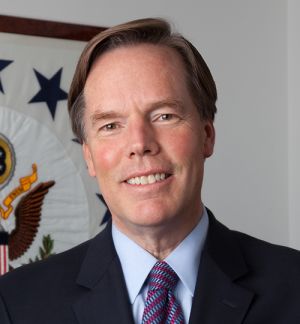His election is better news than Obama expected, but it’s not a panacea
Hassan Rowhani’s surprise victory in Iran’s presidential election last week carries important implications for the country’s future as well as for its tortured relationship with the United States.
Rowhani overturned nearly all predictions and the carefully laid plans of Iran’s leadership by defeating a group of much more conservative candidates. In a field of gray conformists, Rowhani was the only one who took a more moderate line on social, economic, and international issues. The key to his success was in capturing the latent underground sentiment for change that spilled into the streets after the 2009 elections but has been repressed since by a brutal regime crackdown.
His election is better news than the Obama administration had expected. Rowhani’s openness to diplomacy on the nuclear issue is a welcome break from the antagonistic and cynical attitude of his predecessor, Mahmoud Ahmadinejad, and one of the people he defeated, current nuclear negotiator Saeed Jallili. Rowhani seems to understand how isolated a pariah state Iran has become and how profoundly international sanctions have affected Iran’s growing population. His open recognition of “an old wound, which must be healed” — Iran’s three-decade isolation from the United States — is unusual for an Iranian leader to acknowledge.
Iran is now likely to return to talks with the United States, Europe, Russia, and China in one last attempt to reach a negotiated agreement and avoid war over Iran’s increasingly advanced nuclear research effort. President Obama was right this week to welcome a new round of negotiations as there is still time for diplomacy. Iran has not yet crossed either the Israeli or American red lines. And, while negotiations will be difficult, it makes sense to exhaust diplomacy before considering the use of force.
But Rowhani’s election may not be the panacea that many are trumpeting.
First, Rowhani has always been a strong supporter of Iran’s nuclear program. While he is a more polished diplomat than most Iranian leaders and worked well with Europeans in earlier rounds of nuclear diplomacy, it is too early to believe he will overturn the ossified anti-Americanism that has defined Iran’s revolutionary regime for three decades.
Second, there is no question that it will be Supreme Leader Ali Khamenei, not Rowhani, who will continue to call the shots on issues that really matter. Khamenei has tight control of Iranian foreign policy and the military. And he has exhibited consistently for over 20 years a closed, bitter, mistrustful, and even paranoid attitude toward successive American administrations. Iran will show up at negotiations but is unlikely to yield on the key concessions the United States and others will demand.
Third, Iran has been racing ahead on its nuclear agenda while acting in a desultory and uninspired manner in talks with the United States over the past six months. Indeed, in a sober Washington Post article last week, three well-respected American leaders — former Deputy Secretary of State Jim Steinberg, former National Security Adviser Steve Hadley, and former Senator Joe Lieberman — warned “the time is fast approaching when diplomacy will be of little or no value or credibility.” They worry that Iran’s advances in powerful new centrifuges and a heavy-water reactor are “significantly reducing the time that Tehran will need to produce a nuclear weapon.”
Iran will be Obama’s most difficult challenge in 2013. He should respond to Rowhani’s election by putting an ambitious American proposal on the table that would accept a limited Iranian civil nuclear capacity but prevent Iran from becoming a nuclear weapons power under strict and severe international oversight. He would be smart to couple this with even tougher sanctions and the continued threat of force. Nothing else will concentrate the mind of Tehran’s radical leadership circle.
Obama will also need help from the rest of the world. Israel will need to be patient and let the United States lead. Russia and China should be more forceful in pushing Iran to compromise. And if negotiations actually make progress, congressional leaders in Washington will have to refrain from insisting on unreasonable demands, which could torpedo any agreement.
The road ahead with Iran remains twisted, unpredictable, and perilous. To paraphrase President Reagan: Engage Iran, don’t trust yet, and verify.
Burns, Nicholas. “Rowhani's Iran.” The Boston Globe, June 21, 2013



